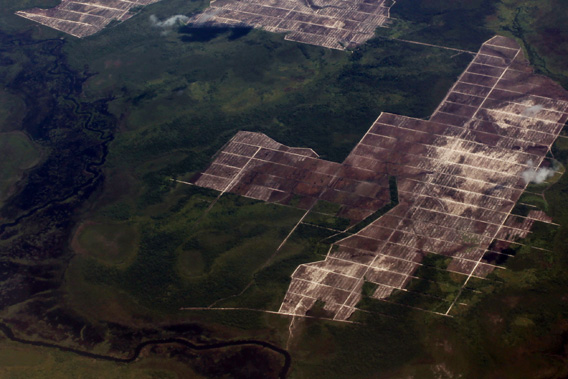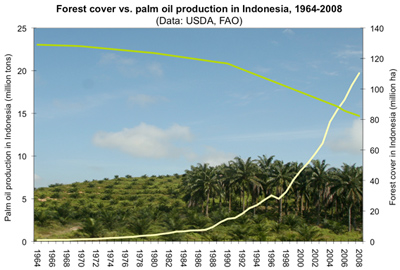- After a two-year moratorium triggered by complaints over social conflict between local communities and palm oil companies, the World Bank has announced the adoption of a framework to restart lending to the palm oil sector.
- The framework was developed after months of consultations with stakeholders, including the private sector, NGOs, farmers, indigenous communities, development experts, and governments.

Oil palm plantations on peatlands in Central Kalimantan. Photo by Rhett A. Butler 2009
After an 18-month moratorium triggered by complaints over social conflict between local communities and palm oil companies, the World Bank has announced the adoption of a framework to restart lending to the palm oil sector. The framework was developed after months of consultations with stakeholders, including the private sector, NGOs, farmers, indigenous communities, development experts, and governments.
“Throughout the consultations,” said Rachel Kyte, IFC Vice President for Business Advisory Services, “many voices in the private, public, and civil sectors recognized the potential of the palm oil production to contribute to reducing poverty when good environmental and social practices are followed. Stakeholders look to the World Bank Group to support a new model for financing in the sector to benefit the poor and protect the environment. This is what we have committed to do.”
 |
Under the new policy—which applies to both the World Bank and the International Finance Corp (IFC)—will prioritize investments that “support smallholders and foster benefit sharing with rural communities.”
“This will take place by helping to strengthen smallholder producer organizations, promoting their access to finance and markets, improving their agronomy practices and productivity, and fostering fair contractual arrangements with larger companies,” said the World Bank in a statement.
The framework also gives priority to initiatives that shift palm oil expansion from forested areas and peat lands to degraded lands. It also aims to support efforts to improve productivity of existing plantations.
“Even though the World Bank is a small player in the palm oil sector,” said Inger Andersen, World Bank Vice President for Sustainable Development, “we can make a contribution to strengthening the sector’s sustainability. Our focus on supporting small farmers and improving productivity – particularly that of degraded plantations – can help poor rural communities benefit while also helping the environment.”
According to the World Bank the palm oil sector employs over six million rural poor worldwide. More than two thirds of palm oil is used for food.
The palm oil lending moratorium emerged out of a complaint filed against the Wilmar Group by the Forest Peoples Programme and other groups on behalf of local communities that said they were victimized by the palm oil giant. An internal audit found that IFC funding of Wilmar violated the IFC’s own procedures, allowing commercial concerns to trump environmental and social standards.
Because IFC standards are influential — private sector banks often adopt them for their own lending standards — the moratorium was hotly contested. Anti-regulation groups within the palm oil sector lobbied intensely for the World Bank to exclude social and environmental safeguards in the new framework. Meanwhile rights’ groups and green activists called for stronger protections.
But not everyone is pleased with the new framework. Marcus Colchester, Director of the Forest Peoples Programme, which led the original complaint to the World Bank Group that triggered the suspension, said the new policy doesn’t go far enough to protect the rights and resources of forest people.
“Although it is clear that the new policy has taken on board some of the comments made by NGOs and government agencies during the consultations, some provisions remain weak,” he told mongabay.com email. “The policy as adopted would discourage but still allow the takeover of indigenous peoples’ and local communities’ lands without their Free, Prior and Informed Consent.”
“The policy is also still unclear about how implementation will be monitored and evaluated. Nor are the IFC and World Bank offering to make reparations for harms caused by previous investments, something indigenous peoples and local communities in Indonesia have strongly demanded. They are still demanding that the World Bank Group keeps out of further investment in palm oil in Indonesia until national legal reforms secure rural people’s land rights and until past abuses are redressed.”
“The policy has weaker provisions on the clearance of peatlands and forests than industry best practice,” he concluded.
The new World Bank/IFC framework is available at www.ifc.org/palmoilstrategy.
|
Response from IFC Global Agribusiness As a way background, we held extensive consultations (nine face to face sessions around the world plus electronic consultations) over the last year with a very diverse group of stakeholders and took into account multiple views. The vast majority of stakeholders want the World Bank Group involved because -as the consultation written record demonstrates – they believe that we can make a positive contribution to addressing the social and environmental challenges through our engagement. Our new approach has been overtly endorsed by range of stakeholders including some of the most respected conservation NGOs, progressive palm oil producing companies, social NGOs and governments who want our support for sustainable palm oil. Sustainable palm oil is possible by benefiting the poor and protecting the environment. Our strategy is not Indonesia-centric. It is intended to apply to all oil palm growing regions. To respond to the issues raised by Marcus. On FPIConsent. The strategy clearly articulates that IFC will require clients to seek RSPO or equivalent certification, and RSPO certification includes FPIConsent as one of its requirements. On an institution-wide level IFC has recommended the adoption of FPIConsent as part of the ongoing review of its Performance Standards which is expected to conclude within the next 1-2 months. If adopted, it will apply to all IFC projects across all sectors, including palm oil. The final decision on this point is subject to Board approval. On monitoring. The strategy includes a monitoring and evaluation framework that provides a detailed listing of the parameters that will be measured to evaluate outcomes and impact (e.g. number of smallholders adopting sustainable production practices; increase in yield per hectare; number of clients certified; relevant E&S performance measures to substantiate certification, etc). In addition the framework indicates the inputs and activities, the expected outputs and outcomes, and how the information will be disclosed. Baselines and targets will be established in connection with individual interventions. On peatlands and forests. The strategy states that in assessing any potential project IFC will consider the ecosystem services, habitat functionality, carbon stock and biodiversity value associated with the land in question. IFC may decide not to proceed with a project because of the potential adverse impact on critical habitat. As an example, IFC would not support any oil palm project that would convert high-carbon-stock peatlands due to their ecosystems services, as well as high carbon and / or biodiversity value. Similar considerations would apply to high-carbon-stock primary tropical forest. We believe that our new risk screening and assessment approach at country and project level, our Performance Standards and requiring clients to meet RSPO or equivalent certification requirements provide adequate protections in relation to key environmental and social concerns raised during the consultation process. Where compliance with these requirements is not feasible (e.g. due to regulatory and policy limitations), IFC will not invest. On conflict resolution. The document highlights existing World Bank Group policies applicable to World Bank Group financed projects that provide mechanisms to work with affected parties and relevant stakeholders to address conflicts or help remediate project level deficiencies such as:
In addition, there are institution wide recourse mechanisms – office of Compliance Advisor/Ombudsman for IFC and the Inspection Panel for the World Bank. |
Related articles
Pro-deforestation group criticizes palm oil giant for sustainability pact
(03/24/2011) World Growth International, a group that advocates on behalf of industrial forestry interests, has criticized Golden Agri Resources (GAR), Indonesia’s largest palm oil producer, for signing a forest policy that aims to protect high conservation value and high carbon stock forest and requires free, prior informed consent (FPIC) in working with communities potentially affected by oil palm development. In a newsletter published March 10, World Growth International claimed that GAR’s agreement “could severely hamper the company’s growth” by limiting where it can establish new plantations and says that negotiating with multiple stakeholders “will delay and complicate any investment by the company.” World Growth International concludes by implying that GAR may renege on its commitment. But Peter Heng, Managing Director, Communications and Sustainability at GAR, disagreed with World Growth International’s assessment.